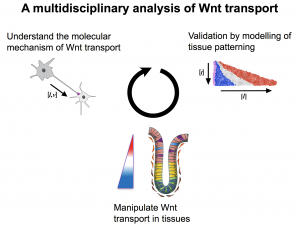Two fully-funded PhD positions in Wnt trafficking at the LSI in Exeter
Posted by Steffen Scholpp, on 9 October 2017
Closing Date: 15 March 2021
The process of subdividing a tissue into functional units represents a classic problem in pattern formation. Signalling proteins – so-called morphogens – orchestrate this process. The traditional view is that morphogens are released from local source and slowly diffuse through a neighbouring tissue to build up a gradient. As Wnt signals act as a key morphogen in tissue patterning, it is believed that similarly these signal proteins diffuse long range to exert their morphogenetic function.
However, we have recently identified long signalling filopodia – so called cytonemes – that tightly control transport of Wnt proteins. We have observed fast and directed distribution through expanding tissues. It is unclear how such a dissemination generates a stable and robust signalling gradient.
The two fully-funded PhD project will focus on:
(1) deciphering of the molecular mechanism of Wnt transport,
(2) simulating of the impact on patterning,
(3) validating the prediction in growing tissue
(4) comparing Wnt trafficking in healthy and diseased tissue

The Scholpp lab in the Living Systems Institute (LSI) Exeter is an optimal environment to conduct these doctoral training studies. The LSI offers unique training opportunities for the PhD student as it allows the student address key problems in life sciences with state-of-the-art equipment in an interdisciplinary environment. The centre facilitates interaction between empirical and theoretical scientists leading to the development of predictive modelling capacity from experimental data, leading to accurate, mechanistic descriptions of biophysical processes for entire ‘living systems’. The project includes close collaboration with the universities of Bristol and Cardiff to complement the required skill sets.
Application deadline: 24.11.2017
Start date: Sep/Oct 2018
Detailed information can be found here:


 (No Ratings Yet)
(No Ratings Yet)